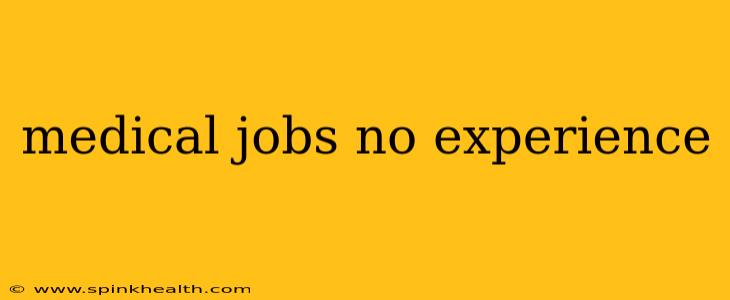So, you're dreaming of a career in healthcare, but lack direct experience? Don't worry, you're not alone! Many rewarding medical jobs welcome entry-level applicants, offering a fantastic stepping stone into this dynamic field. This journey might start with a role that doesn't involve direct patient care, but it's a crucial first step towards your ultimate goal. Let's explore some options and pave the way for your successful healthcare career.
What are some entry-level medical jobs?
This is a question many aspiring healthcare professionals ask. The good news is that several roles exist that don't demand prior experience, acting as excellent entry points into the field. These often provide valuable skills and knowledge, allowing you to grow and potentially transition to more advanced roles.
Some examples include:
- Medical Assistant (MA): While some MAs require certification, many entry-level positions prioritize on-the-job training. These roles involve assisting physicians and nurses with clinical and administrative tasks.
- Certified Nursing Assistant (CNA): Although certification is necessary, the training is relatively short and accessible to most. CNAs provide basic patient care under the supervision of nurses.
- Medical Receptionist: This position requires strong organizational and communication skills. Receptionists handle scheduling appointments, answering phones, and managing patient records.
- Home Health Aide: Providing personal care and support to patients in their homes, this role can be both physically and emotionally rewarding.
- Phlebotomist: Drawing blood samples requires training and precision, but entry-level positions are available after completing a short course.
- Medical Scribe: Working alongside physicians, scribes document patient encounters, saving doctors time and improving patient record accuracy.
What are the educational requirements for medical jobs with no experience?
The educational requirements vary greatly depending on the specific role. Some jobs may require only a high school diploma or GED, while others benefit from post-secondary education or certification. For example:
- Medical Receptionist: A high school diploma or equivalent is typically sufficient, but excellent communication and computer skills are crucial.
- CNA: Requires completing a state-approved CNA program and passing a certification exam.
- Home Health Aide: May require only on-the-job training, but formal certification programs enhance career prospects.
- Phlebotomist: Usually requires completing a phlebotomy technician program.
Remember to check the specific requirements for each job you apply for. Many employers offer on-site training programs, further enhancing your skills and qualifications.
How can I get experience in the medical field without prior experience?
This is a classic chicken-and-egg scenario, but it's solvable! The key is to demonstrate initiative and a genuine passion for healthcare.
- Volunteer work: Offering your time at a local hospital, clinic, or nursing home provides invaluable firsthand experience and demonstrates your commitment.
- Internships: Although often competitive, internships offer supervised practical experience within a healthcare setting.
- Shadowing: Observing healthcare professionals in their daily routines gives you an insider's perspective and allows you to learn practical skills.
- Networking: Attending healthcare events and connecting with professionals in the field broadens your network and opens doors to opportunities.
What are some tips for finding a medical job with no experience?
The job search for entry-level positions requires a strategic approach:
- Tailor your resume: Highlight transferable skills from previous jobs, such as customer service, communication, and organizational skills.
- Craft a compelling cover letter: Emphasize your enthusiasm for healthcare and demonstrate your willingness to learn.
- Utilize online job boards: Websites like Indeed, LinkedIn, and specialized healthcare job boards are great resources.
- Network actively: Attend career fairs, connect with healthcare professionals, and leverage your existing network.
- Be persistent: The job search can be challenging, but persistence pays off.
What skills are most important for entry-level medical jobs?
Beyond the technical skills required for specific roles, certain soft skills are universally valuable:
- Communication: Excellent communication is crucial in all healthcare settings, both with patients and colleagues.
- Empathy: Understanding and responding to patients' needs and emotions is paramount.
- Teamwork: Healthcare is a team effort, requiring effective collaboration with colleagues.
- Time management: Effectively managing your time and prioritizing tasks is essential.
- Problem-solving: The ability to analyze situations and find effective solutions is a valuable asset.
Starting your healthcare journey may seem daunting, but with the right approach and a proactive attitude, you can successfully launch your career in this rewarding field. Remember, every journey begins with a single step – so take that step and explore the exciting world of medical jobs!

